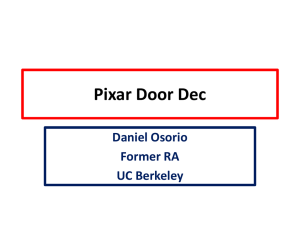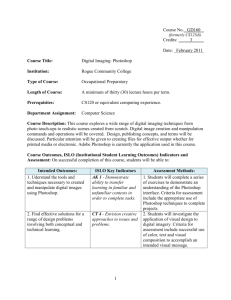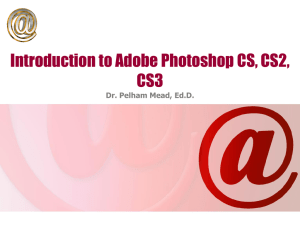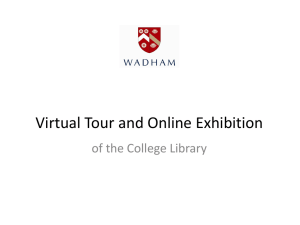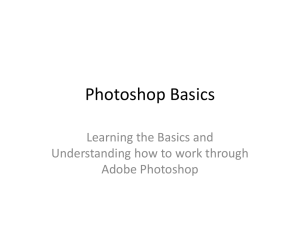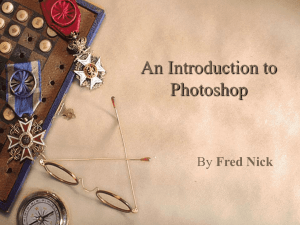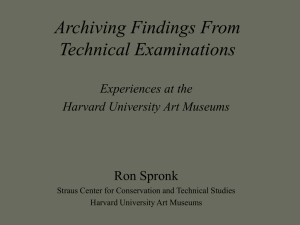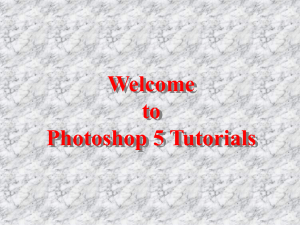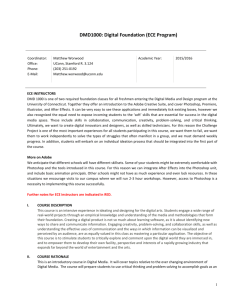syllabus - Florida Atlantic University
advertisement
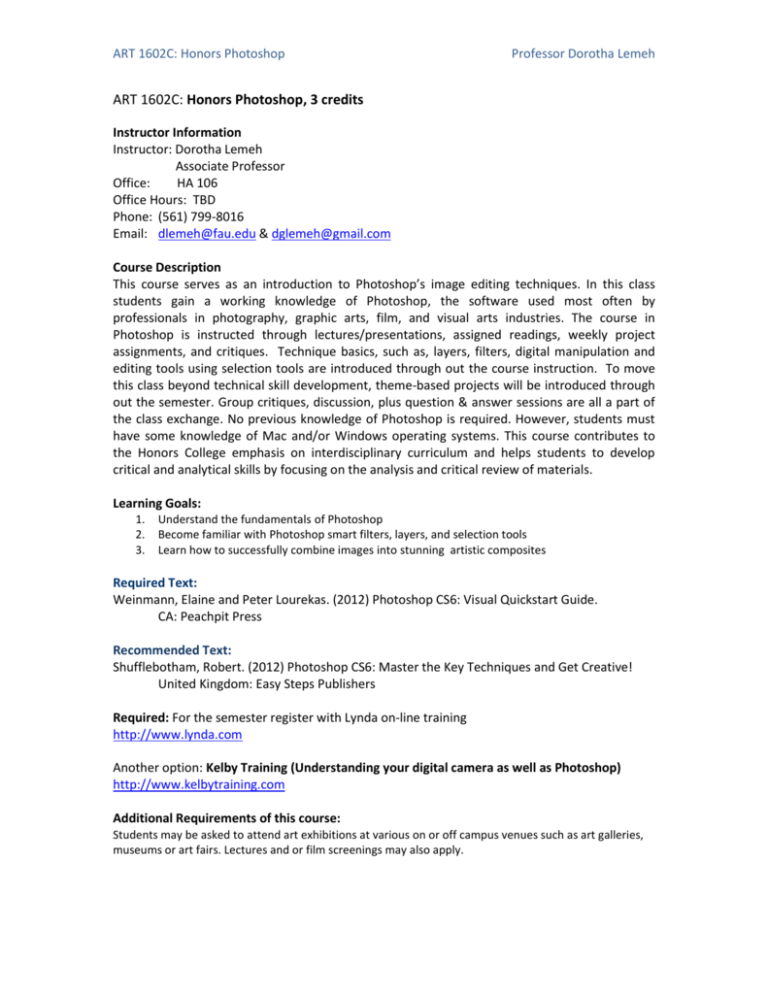
ART 1602C: Honors Photoshop Professor Dorotha Lemeh ART 1602C: Honors Photoshop, 3 credits Instructor Information Instructor: Dorotha Lemeh Associate Professor Office: HA 106 Office Hours: TBD Phone: (561) 799-8016 Email: dlemeh@fau.edu & dglemeh@gmail.com Course Description This course serves as an introduction to Photoshop’s image editing techniques. In this class students gain a working knowledge of Photoshop, the software used most often by professionals in photography, graphic arts, film, and visual arts industries. The course in Photoshop is instructed through lectures/presentations, assigned readings, weekly project assignments, and critiques. Technique basics, such as, layers, filters, digital manipulation and editing tools using selection tools are introduced through out the course instruction. To move this class beyond technical skill development, theme-based projects will be introduced through out the semester. Group critiques, discussion, plus question & answer sessions are all a part of the class exchange. No previous knowledge of Photoshop is required. However, students must have some knowledge of Mac and/or Windows operating systems. This course contributes to the Honors College emphasis on interdisciplinary curriculum and helps students to develop critical and analytical skills by focusing on the analysis and critical review of materials. Learning Goals: 1. 2. 3. Understand the fundamentals of Photoshop Become familiar with Photoshop smart filters, layers, and selection tools Learn how to successfully combine images into stunning artistic composites Required Text: Weinmann, Elaine and Peter Lourekas. (2012) Photoshop CS6: Visual Quickstart Guide. CA: Peachpit Press Recommended Text: Shufflebotham, Robert. (2012) Photoshop CS6: Master the Key Techniques and Get Creative! United Kingdom: Easy Steps Publishers Required: For the semester register with Lynda on-line training http://www.lynda.com Another option: Kelby Training (Understanding your digital camera as well as Photoshop) http://www.kelbytraining.com Additional Requirements of this course: Students may be asked to attend art exhibitions at various on or off campus venues such as art galleries, museums or art fairs. Lectures and or film screenings may also apply. ART 1602C: Honors Photoshop Professor Dorotha Lemeh Additional Resources Peachpit: http://www.peachpit.com / http://www.peachpit.com/creativeedge/ http://www.peachpit.com/newsletters/index.aspx National Association of Photoshop Professionals http://www.photoshopuser.com Portable Storage: For this course students are required to purchase and bring to every class a 16G or 32G USB flash or portable hard drive. The HC cannot be held responsible for lost project assignments left on the iVAHD Lab or other FAU computers so make certain that prior to powering down the computer transfer your information on to a portable drive or USB flash. Computer Software: Though helpful, students are not required to purchase the latest Photoshop software for this course. If students prefer, on their own laptops, to subscribe to Adobe Photoshop in the “Creative Cloud”, then the prices associated with those services are located on their official website found here: [http://www.adobe.com/products/creativecloud.html]. Also check Adobe’s membership site the terms regarding the individual’s use with regards to educational purposes for potential discounts [http://www.adobe.com/products/creativecloud/buying-guide-education.html]. Note: In class and homework assignments can be completed in the iVAHD lab during class and designated lab hours. Photoshop is a cross platform application, so even if Windows PC is used to work on an image, files can be moved from the PC to the Macs used in the classroom. Grade Assessment: Attendance, Class Participation, Performance, and Visual Assignments Attendance and Class Participation are 20% Regular attendance is not only expected, it is graded. All students are expected to come to class, be on time, and have assignments completed. Every absence after 3 will result in the lowering of the overall grade by10%. Six absences will result in a grade of "D" after 8 absences a grade of "F" is earned. 4 absences = highest grade is a B+ 5 absences = highest grade is a C+ 6 absences = highest grade is a D 7 absences = automatic failure Class participation means coming to class having completed the assigned visual project, the student art assessment, and assigned readings. It also means being prepared to ask and answer questions on artworks, artists, and art theories viewed, read or discussed. It also may mean working in small groups during these discussions and participating in student centered group critiques. Class participation is looked on as a vital part of student learning and engagement and therefore is graded. Lack of class participation in class discussions will result in the lowering of your grade by 10%. Letter Grade A AB+ B B- Number Grade 95-100 90-94 87-89 82-86 79-81 C+ C CD F 2 76-78 65-75 60-64 50-59 0-49 ART 1602C: Honors Photoshop Professor Dorotha Lemeh Policy on makeup exams/quizzes, papers and handing in late work Visual assignments not completed due to missed classes: Work not completed due to missed classes, tardiness, or ineffective use of time has to be made up outside of class. Tuesday, Thursday and Friday open lab is a good time to make up work. Weekend entry into the Art or Computer labs is possible when you contact the on campus University Police. Remember that only students in the class are allowed in the space. Be sure to bring your Owl card. Turning in Late Visual Assignments: At times a student may have unforeseen events impact on the handing in of her or his artwork by the assigned due date. A student can request an extension, however, the extension (depending on the reason) may or may not be granted. Such an extension will be decided on a case-by-case basis and is subject to the instructor’s approval of such an action. Though there are numerous reasons for an assignment‘s incompletion 20% will be subtracted from the final grade for a work that has not been granted an extension and submitted a day after it is due. After one week 30% will be subtracted from the final grade. Redoing/Resubmitting Visual Assignments: At times a student may want to redo a project assignment based on new insights, experimentation, clarification of the project after a critique, or other valid reasons. The student is encouraged to redo the work or enhance the art piece at any time during the semester. This must take place outside of the class period during open art or computer lab time! If resubmitting the project for grade reconsideration the resubmission can only be done once per assignment. A designated time for the redo will be provided & after that time period has lapsed no work will be considered. Digital and Electronics in and outside of the Classroom Students are encouraged to bring digital cameras, laptops, ipads, wacom or bamboo tablets, digital video cameras and other electronic devices to class for the sole purpose of creating art images. This is a time for working towards completing class assignments and not viewing your email, texting, watching on-line videos, checking facebook or any other form of non-academic activity. Abuse of such a privilege may lead to banning these items from the class. Computer and Art Labs – Absolutely No FOOD or DRINK in the computer labs! Using the art and computer labs outside of assigned class time is an integral part and necessary component of this course. Computer labs that have photoshop are located in HC 111 & on the 1st & 2nd floors of the SR buildings. A list of students who are to be allowed to enter the Art Lab after hours will be submitted to the proper authorities for approval. If your name is not included on the list be sure to notify the instructors, otherwise entry into these spaces will be prohibited. Code of Academic Integrity policy statement Students at Florida Atlantic University are expected to maintain the highest ethical standards. Academic dishonesty is considered a serious breach of these ethical standards, because it interferes with the university mission to provide a high quality education in which no student enjoys an unfair advantage over any other. Academic dishonesty is also destructive of the university community, which is grounded in a system of mutual trust and places high value on personal integrity and individual responsibility. Harsh penalties are associated with academic dishonesty. For more information, see University Regulation 4.001. http://www.fau.edu/regulations/chapter4/4.001_Code_of_Academic_Integrity.pdf 3 ART 1602C: Honors Photoshop Professor Dorotha Lemeh Note of Honors Distinction: This course differs substantially from the non-Honors version. First, the writing component of the course will be much more demanding, and will prepare students for upperdivision college writing and for work on the Honors Thesis. Students will be exposed to vocabulary of a specifically theoretical nature, and will be expected to comprehend these new concepts and to deploy these new terms in their own critical thinking and writing. In addition, we will begin professionalizing our own readings and analyses of these texts. Students will be expected to familiarize themselves with the history and the ongoing critical and scholarly conversation about these works, and will give in-class presentations about critical history and about the living scholars in the field as it now stands. Students will also engage with the theoretical tools used by today’s reading community to study literature. Most importantly, this course will reflect the interdisciplinary nature of Honors education and will inculcate critical attitudes and skills that will teach you how to learn for yourself. Students with Special Needs The rights of students with disabilities are protected under Section 504 of the Rehabilitation Act of 1973 (Section 504) and the Americans with Disabilities Act of 1990 (ADA). Please consult the University website for additional information concerning Disability Services: http://www.osd.fau.edu . In compliance with the Americans with Disabilities Act (ADA), students who require reasonable accommodations due to a disability to properly execute coursework must register with the Office for Students with Disabilities (OSD) -- in Boca Raton, SU 133 (561-297-3880); in Davie, LA 240 (954-236-1222); or in Jupiter, SR 110 (561-7998010) – and follow all OSD procedures. Any student with a documented disability or special need, who requires reasonable accommodations for assignments will need to contact Disability Services Office at the beginning of the semester. Class Room Etiquette University policy on the use of electronic devices states: “In order to enhance and maintain a productive atmosphere for education, personal communication devices, such as cellular telephones and pagers, are to be disabled in class sessions.” Course Schedule At-A-Glance The allotted time for each session is 2 hours and 50 minutes. Come prepared each session with the equipment needed to closely observe, render/illustrate, digitally capture, photoshop, and write about the visual project assigned. Also come prepared to discuss any outside reading assignments provided. Week one: Photoshop Day 1: review of syllabus Lecture: Getting Started - Photoshop Basics Introduction to selection tools Discussion: Keyboard short cuts & Creating Files Read Robert Shufflebotham’s Photoshop CS6: Master the Key Techniques and Get Creative! Day 2: Selection tools continued Read: Chapter 1: Basic Theory: Color Management & Chapter 2: Creating Files Week two: Capturing Images Lecture: Introduction to Layers Discussion: Tiff, Gif, JPEG, & PDF Presentation: Copyright and ethical issues concerning the use of Photoshop In class: Assignment 1 Critique: Analysis & Reflection Read Robert Shufflebotham’s Photoshop CS6: Master the Key Techniques and Get Creative! Chapter 3: Open and Save Files & Chapter 4: Image and Color Basics 4 ART 1602C: Honors Photoshop Professor Dorotha Lemeh Class discussion session About the assignments: How to email your images 1. No larger than 300 dpi 2. Save in .tif format (PSD is sometimes too big & jpeg flattens the image) 3. Send the information to my gmail account or burn on a CD and hand it in. Week three: QUIZ 1 Day 1: Introduction to RAW, Adobe Bridge and Layer Masks Class Discussion - RAW, Adobe Bridge and Layer Masks Read Robert Shufflebotham’s Photoshop CS6: Master the Key Techniques and Get Creative! Chapter 5: The Painting Tools & Chapter 6: The Editing Tools Day 2: Layer Masks continued. In class assignments provided. Week four Those pesky panels in Photoshop In class: Assignment 2 - Workspaces & Using a Wacomb Tablet Discussion: Workspaces & Using a Wacomb Tablet Critique: Analysis & Reflection Read Robert Shufflebotham’s Photoshop CS6: Master the Key Techniques and Get Creative! Day 2: The History Palette, Blend Modes and Smart filters Chapter 7: Selections & Chapter 8: Layers Week five In class: Assignment 3 - Using Artistic Filters in Photoshop Discussion: Panels, Filters, and Layers Critique: Analysis & Reflection Read Robert Shufflebotham’s Photoshop CS6: Master the Key Techniques and Get Creative! Chapter 13: Filters Chapter 10: Paths & Chapter 11: Channels & Masks Week six Quiz 2 Day 1: Creative Imaging Techniques: Combining Images In class: Assignment 4 - Transformation Critique: Analysis & Reflection Day 2: Color Read Robert Shufflebotham’s Photoshop CS6: Master the Key Techniques and Get Creative! Chapter 12: Color Adjustments Week seven Creative Imaging Techniques & Color continued In class: Assignment 5 - Texture Critique: Analysis & Reflection Complete and turn in Assignments 1 – 5 Week eight In class: Assignment 6 - Invention 5 ART 1602C: Honors Photoshop Professor Dorotha Lemeh Critique: Analysis & Reflection Read Robert Shufflebotham’s Photoshop CS6: Master the Key Techniques and Get Creative! Chapter 14 Web & Multimedia Week nine In class: Assignment 7 – Visual Movement Critique: Analysis & Reflection Read Robert Shufflebotham’s Photoshop CS6: Master the Key Techniques and Get Creative! Read Chapter 15: Animations Discussion: Printing - RGB & CMKY Weeks ten through fourteen Animating in Photoshop In class: Assignment 8 Critique: Analysis & Reflection Complete and turn in Assignments 6 & 7 Week fifteen and sixteen Final assignment 8 due: In class discussion and critique. Materials List Some of these items you can purchase at one of the following stores: Best Buy, Staples, Walmart, Office Depot, or Amazon Digital camera or Smart Phone (Extremely useful, though not required) Journal, 50 to 100 pages 16G or 32G Memory Stick/flash drive or Portable external Hard Drive (up to 1 TB USB 3.0) Box of CD/DVD discs 50 to 100 sheets of 8 x 10 Photographic Paper Bibliography Eodice, Lynne (2008) Photos that Inspire: Photo Workshop. New Jersey: Wiley Publishing, Inc. Freeman, Michael. (2007) The Photographer’s Eye: Composition and Design for Better Digital Photographs. St. Louis, MO: Focal Press. Fluer, Blue. (2007) Composition Photo Workshop. Hoboken, NJ: Wiley Press. Giordan, Daniel. (2005) The Art of Photoshop for Digital Photographers. Indianapolis, Indiana: Sams Press. Grau, Oliver. (2007) Media Art Histories. Cambridge, MA: MIT Press. 6 ART 1602C: Honors Photoshop Professor Dorotha Lemeh Popper, Frank. (2007) From Technology to Virtual Art. Cambridge, MA: MIT Press. Priebe, Ken A. (2006) The Art of Stop-Motion Animation. Boston, MA: Course Technology PTR. Rodarmor, William. (2005) Creating Photomontages with Photoshop: A Designer’s Notebook. Cambridge, MA: Oreilly Media, Inc. Press. Schminke, Karin, Krause, Dorothy Simpson, Lhotka, Bonny Pierce. (2004) Digital Art Studio: Techniques for Combining Inkjet Printing with Traditional Art Materials. New York, NY: Watson-Guptill Publication Standen, Amy. (2005) Adobe Photoshop Master Class: Maggie Taylor’s Landscape of Dreams. Berkley, CA: Adobe Press. ______________, Tribe, Mark, Reena Jana, Uta Grosenick, eds. (2006) New Media Art. Los Angeles, CA: Taschen Press Wands, Bruce (2007) Art of the Digital Age. New York, NY: Thames & Hudson. Wellins, Mike. (2005) Storytelling through Animation. Boston, MA: Charles River Media. White, Michele. (2006) The Body and the Screen: Theories of Internet Spectatorship. Cambridge, MA: MIT Press Zakia, Richard. D. (2007) Perception and Imaging, Third Edition: Photography-A Way of Seeing. St. Louis: MO: Focal Press 7
